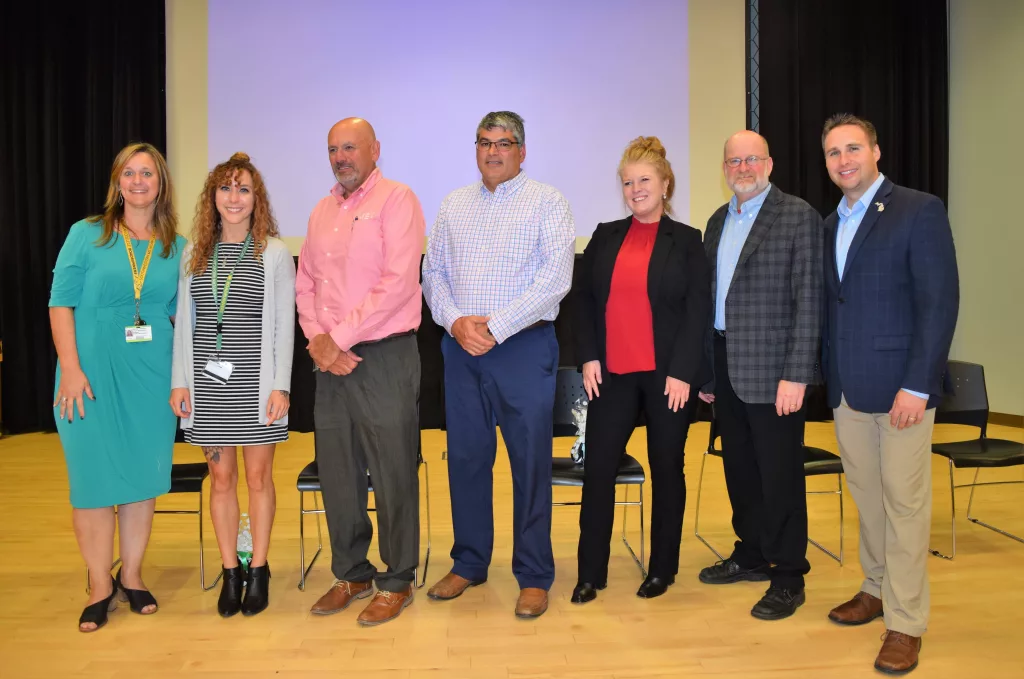– Submitted by SMC
Flying cars “The Jetsons” promised have not yet materialized, though that may be forgotten with the advent of drones large enough to carry passengers.
Southwestern Michigan College hosted a “Future of the Economy” panel discussion Sept. 29 for which co-host Market Van Buren Executive Director Zachary Morris set the stage by reminding the audience of the past 10 years’ transformative changes.
“Sometimes you have to go backwards to go forward,” said Morris, who leads the economic development agency for Cass and Van Buren counties. He showed photos comparing Rosey the Jetsons’ robot maid of 1962 to Roombas 60 years later.
“Dowagiac and other towns have small airports where you could land your drone,” Morris said. “Ten years ago, big breakthroughs were robotic hands, 3D printing, Tesla electric cars and paying electronically with your cell phone. A lot can change in 10 years, so what’s it going to look like for the Class of 2032?”
Morris foresees a strong future for devices such as the Cicret Bracelet worn on the wrist that can do everything which can be done on a tablet or smartphone, but projected on the skin.
“I think drone transportation is going to be commonplace in my lifetime,” Morris said. “Remote surgery, with a doctor controlling a robot from somewhere else. And I think Industry 4.0 (the fourth industrial revolution) is going to be a massive shift” as huge amounts of data from increased interconnectivity and smart automation are harnessed to save or make money.
For local answers, Morris turned to panelists Tom Stanek, Director of Kalamazoo Operations for Owen-Ames Kimball (OAK) Construction; Terry Rubenthaler, COO of Midwest Energy and Communications (MEC); and CHT’s Melanie Hunsberger, employee engagement coordinator and SMC graduate, and CHT Director of Operations Richard Hughes, Ph.D.
CHT USA, a Cassopolis/Richmond, Va., chemical company, has grown to more than 150 employees in 22 years in the Cass County seat and is expanding with a $23 million addition that will increase floor space 50 percent locally by 2023.
Stanek, a Western Michigan University graduate, started as a laborer and worked his way up through project management.
Founded in 1891, the $250 million, 190 employee-owned company has offices in Kalamazoo, Grand Rapids, Naples and Fort Myers, Fla., and Castle Rock, Colo. OAK welcomed a record 21 interns last summer and is “proactively looking for more women,” Stanek added.
“There’s a lot of investment going into roads, bridges, railroads and broadband right now,” Stanek said. “We’re still seeing a lot of bonds passed for K-12 education, so it’s booming for the next three to five years.” Arrayed against opportunities, such as strong demand for young people, are challenges such as rising material costs and supply-chain issues.
“There’s been a labor shortage since 2008, when lots of employees left,” Stanek said. “We’ve never caught up. Recruiting and retaining talent is across the board, not just in construction. There’s a huge opportunity for SMC students to jump into robotics or drones. You can explore careers you’ve never heard of through job shadowing.”
Hunsberger, who attended Decatur Junior-Senior High School with Morris, transferred with an SMC associate degree to Bethel University for an organizational management bachelor’s degree. The Sister Lakes resident spent seven years in Florida before joining Edward Lowe Foundation for five years, then CHT 2 ½ years ago.
CHT is a global producer of silicone products with 26 manufacturing locations.
Hughes, who holds a doctorate in chemistry from Montana State University, said, “We make about 400 products with silicon and silicone polymers. You use them every day and probably don’t realize it because they’re in shampoo, deodorant and the little clam shells strawberries come in. We service all the industries — leather, textiles, oil, gas, food — so we’re stable, no matter how buying habits change.”
“There is no economy without strong, reliable utilities,” said Rubenthaler, a University of Nebraska-educated electrical engineer. “We think the future of the economy on the electric side is micro-grids, renewable energy and battery storage, and we need people who know how to develop and manage those complicated systems.”
The former Fruit Belt Electric Cooperative, established in 1938, extended power lines to rural farm communities. Twenty-five years ago it added propane services. Ten years ago, MEC began providing broadband services. MEC does its own accounting and billing. There are also opportunities in everything from network engineering to sales, human resources and fiber splicing.
“What’s coming next year is 10-gigabit (10 billion bits per second) residential service,” Rubenthaler said. “We need IT database management from people who know how to turn all this data into something we can use.”
Robotic linemen will climb poles while employees tap instructions on tablets from the ground, “taking away a lot of the danger,” he said.






